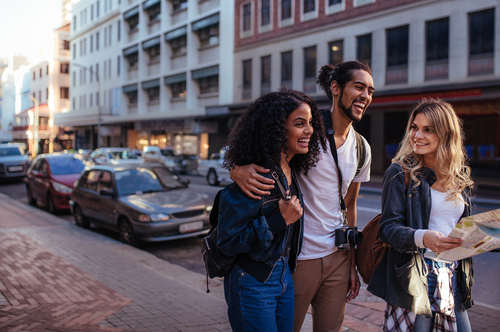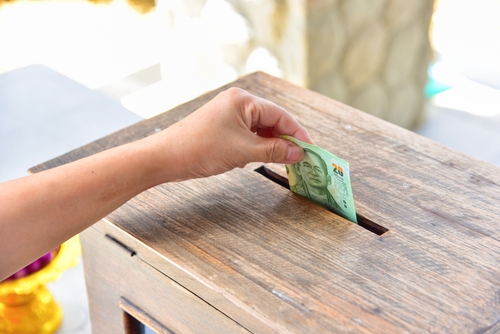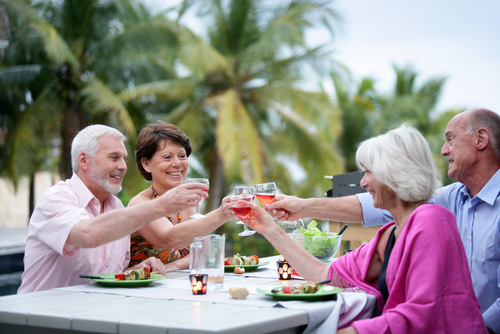How exciting — you’re going on an overseas trip! Traveling is one of the great adventures of life and essential to many of us. While you prepare for your trip, remember that you’ll soon be a guest in another part of the world, and good manners are just as important as your passport.
As someone interested in traveling, you know how important it is to be open to new things when seeing the world. Whether your next trip is domestic or abroad, it’s important to learn about the traditions and culture of where you’re going.
But don’t leave your good manners behind. You want to make a good impression when you arrive and as you explore. Be sure to brush up on these basic rules for fitting into the local culture at your destination. Read ahead for our travel etiquette tips.
Key Points
- Learn what to do — and not do — while traveling
- Respectfully immerse yourself in a new culture
- Explore the traditions of different regions around the world
- Understand the rules of engagement for air travel
- Learn about cultural faux pas that might be different from your own
8 Travel Etiquette Tips
Unfortunately, many travelers have a reputation for bad manners. While this may or may not be warranted, it’s our job as global citizens to be respectful when traveling to new places. Practicing good manners is relatively easy to do with a little research and observation of local customs. Here are eight tips that can turn you into the type of traveler that locals will be happy to have in their country.

Have Good Manners During Air Travel
Having good manners is arguably one of the most trying parts of traveling. Follow these simple steps to be a good-mannered traveler during your flight:
- Be prepared. Preparation is an important step in managing your air travel plans. Have your tickets ready and check-in online, if possible. You may also want to print your accommodation information so you have it ready after you land. Pack something to read and a light jacket. Bring snacks and a refillable water bottle, as some airlines no longer provide meals or blankets while on board. You may also want to bring a few toiletries in preparation for a long flight. You want to have all the things you’ll need for your flight without relying on your airline for anything extra.
- Be nice. Remember your manners on the plane. Share the armrest. Be careful when reclining your seat in case the person behind you has their tray table down. Wait your turn to board the airplane and deplane. Say “please” and “thank you” to flight attendants and “pardon me” to fellow passengers you ask to stand up to exit your row.
- Be patient. Long lines are the norm in airports. Be prepared to wait your turn at the ticketing counter, going through security, boarding and deplaning, and for service while you’re in the air. There are many free meditation apps available online if standing in line isn’t your thing. Breathe and know you’ll eventually arrive.
- Be compassionate. If the crying baby drives you crazy, try watching a movie, listening to a podcast, or listening to some calming music. This would be a great time to remind you to bring your noise-canceling headphones if you have a pair! Try not to give the overly burdened parents a look of distaste. Remember that air travel can be harder for some than others. It may even make you feel better to let someone who looks like they’re having a rough day go ahead of you. Remember that you’re on your way to a great adventure, and it’s best to start the trip with a positive state of mind.
Learn Polite Phrases in the Local Language
Although many people speak English, don’t assume everyone you encounter during your travels will speak your language. If you’re traveling to a country with a language different from your own, it’s polite to learn at least a few helpful phrases.
It might be a good idea to buy a language translation book and look up these words and phrases before you leave:
- Hello
- Please
- Thank you
- Pardon me, do you speak English?
You’ll be amazed at how thankful locals will be that you approached them in their language to ask for help.
Read Up on Tipping
Tipping practices can vary by destination, so familiarize yourself with the expectations of your destination. While North American customs dictate tipping an average of 20% of the total bill for meals, this may not be the norm where you’re going. It could even be considered rude or insulting in some situations. For example, tipping in Japan is considered inappropriate.
It’s important to remember that it may be customary to tip other service employees, like hotel staff and transportation drivers. And although it isn’t considered a tip, it might be customary to offer a donation at religious sites. A little research will help you understand who and how much to tip or donate at your destination. With that being said, it’s good to keep spare change on you during your travels in the event that you need to tip or leave a donation.

Know When a Gift Is Appropriate
If you’re staying with a host, it might be appropriate to give a gift as a sign of thanks. A great host gift could be something simple that represents your home, like a local tea or something that can be shared, like a bottle of wine, but keep in mind that alcohol is not acceptable in certain parts of the world. Be wary of flashy or overly expensive host gifts, though, as they can be seen as inappropriate and might embarrass your host.
Dress Conservatively
It’s important to dress comfortably during your travels, as you will most likely be walking. Good shoes are a must. However, it might also be good to avoid showing too much skin. There may even be rules about dressing a certain way in some places, especially if you are visiting religious sites. Do your research on the places you’ll visit during your travels to avoid over-dressing, under-dressing, or inappropriate dress.

Do Your Research
Research your destination’s local customs just as diligently as you did for your flight and accommodation. For example, in some parts of the world, you should remove your shoes before entering a private residence or use only your right hand while eating. There are other things you might not want to do as well, including talking too loudly in religious buildings or skipping the line.
Spend some time reading about local customs to prevent potentially embarrassing gaffes. Try using the search phrase “local customs in [destination name]” for helpful tips on what to do and what to avoid during your travels.
Be Mindful of Culture-Specific Faux Pas
The definition of a faux pas is “an embarrassing or tactless act or remark in a social setting.” As an expert traveler, it’s a great idea to know what not to do while you’re traveling. Here are some examples of some destination-specific travel etiquette tips and faux pas to avoid:
Mexico and Latin America
Be aware of the differences in the way you treat men and women in Mexico and Latin America. The following should help guide you through some of these differences, as well as some other helpful tips:
- Do shake hands with men upon introduction.
- Do shake hands with women who offer their hand.
- Don’t offer your hand to a woman who gives a slight bow to you. Do the same in return.
- Do know that a kiss on both cheeks is considered an appropriate greeting.
- Do be aware that those you encounter may have a smaller sense of personal space. Expect closeness while conversing with locals in Mexico and Latin America.
- Don’t stand with your hands on your hips or in your pockets. It’s considered rude.
- Do ask for the check when you’re ready to pay in a restaurant. Etiquette dictates the wait staff to bring the check only when prompted.
- Do hand items to one another. Don’t toss them, as some may construe the act as rude.
Asia
While it’s hard to generalize the entirety of Asia, visitors to this region of the world can expect a calm environment. Here are some helpful do’s and don’ts when visiting Asia:
- Do expect highly formalized dining in China, as having shared meals is considered good manners to welcome guests.
- Don’t be embarrassed to try using chopsticks instead of a fork or, alternately, show off your expert skills.
- Don’t tip unless posted or told otherwise in many places in Asia.
- Don’t use your left hand to touch any food or drink items in India and Indonesia. Indonesians reserve their left hand for “dirty jobs,” like going to the bathroom.
- Don’t accept gifts on the first try if you receive one in Japan. Wait until the second or third attempt.
- Don’t blow your nose in public.
- Do accept complimentary tea at meals out.
- Do wear makeup for formal events; it is impolite to dress too casually.
- Do expect another person to fill up your drink. If you must fill up your own water, use your right hand only to do so.
- Be careful with public displays of affection; they are considered immodest in most parts of Asia and rude.
- Don’t say unkind things about members of the Royal Family. You could even receive a prison sentence for speaking against the Thai Monarch!
Africa
If you’re going to Africa, you will most likely encounter religious monuments and sites. Dress very conservatively, and women should make sure they are properly attired. Alcohol is not available in some parts of Africa, and drunkenness can be a serious social faux pas or even illegal.
- Do research your destination’s policies on alcohol before you arrive.
- Don’t assume you can wear casual attire.
- Do prepare for the local climate. It could be different from the one at home.
- Do know you may need to wear special clothing that covers more of your body than you’re accustomed to if you’re visiting religious sites.
Europe
Americans may find European traditions and customs familiar if slightly varied. Follow these do’s and don’ts of traveling to Europe:
- Do remove hats while indoors. (Women are exempt from this rule)
- Do remove coats, jackets, and other outer garments before sitting indoors. Taking these items off inside is considered especially rude before eating.
- Don’t talk about money or wealth. Doing so is seen as rude.
- Don’t offer chrysanthemums as a gift, as they are often used to signify mourning.
- Don’t eat at religious sites.
Local Customs in America
Be mindful of your own culture and know it might be different where you’re going. Here are some customs that are specific to the United States:
- Reliance on having your own car.
- Eating large portions of food, including fast food.
- Celebrating U.S.-specific holidays like Thanksgiving and Fourth of July.
- Tipping foodservice and hospitality staff.
Be Respectful
Respect is the most important travel tip of all. Know that you are a guest in another country. Be respectful of other people and their traditions. Some general rules include:
- Be courteous when talking on your cellphone.
- Keep your voice down in crowded places.
- When visiting sacred religious sites, it is important to dress modestly.
- Be prepared for long lines at the airport and plan accordingly.
- Always be aware of waiting your turn in line.
- Know a little bit of the local language as a sign of respect.
- Read up on the specific local customs to avoid inadvertent faux pas.
- Treat everyone you meet with respect.
Following these simple rules will aid you in your travels. Have fun, and remember your manners!

Go International With VacationRenter
Find your next perfect getaway on VacationRenter by browsing vacation rentals at your destination. By using automation and artificial intelligence, we bring together the best rental options from the leading travel sites, so you can spend more time learning about local customs and less time trying to find the right place to stay. See how VacationRenter is the easiest way to find vacation rentals across the globe.